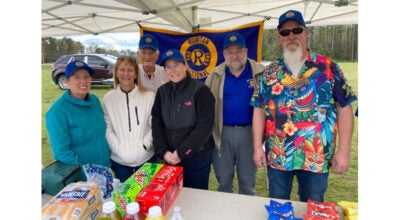Spirited comments highlight 1967 bypass hearing
Published 8:07 pm Tuesday, July 19, 2022
|
Getting your Trinity Audio player ready...
|
By Clyde Parker
On June 22, 1967, more than 115 speakers, protestors, and interested parties filled the Franklin City Hall Courtroom for the State Highway Department’s public hearing on a bypass around the City of Franklin. Two options were presented, one to the north of Franklin and one to the south.
Leading proponents of the southern bypass route were representatives of the Southampton County Board of Supervisors and the Franklin City Council.
In presenting the City’s resolution favoring the southern route, Mayor Darden Jones said the northern route would disrupt the new Franklin High School property. And, he added, it would cut up the area to the north of the city, which may in the future be the location of a large lake, and public recreation area. Those developments would serve not only the people of Franklin and Southampton County, but also residents of Isle of Wight and Nansemond counties.
William H. Goodwin, Sr., President of the Franklin Chamber of Commerce, submitted a resolution to the Highway Commission in support of the southern bypass route.
G.M. Cornell, Executive Director of Nansemond County, took the floor in approval of the southern route. Cornell, however, recommended that the commission, in its construction of the bypass, try to avoid any interference with Holland Agricultural Experiment Station.
Northern bypass backers were mostly property owners in Isle of Wight County. Because of the loss of traffic that would result from a southern bypass route, businesses along the old Route 58 in Isle of Wight would be hurt financially. The Airway Motel/Restaurant would be adversely affected.
Fred C. Stewart, speaking as a landowner in Isle of Wight County, attacked the southern route. He said, “It would be disastrous to turn Route 58 through Isle of Wight into a secondary road.” The proposed southern route would completely bypass Isle of Wight. G. A. Barlow, Jr., Chairman of the Isle of Wight County Board of Supervisors expressed that same concern. “The people of Isle of Wight would suffer great financial loss,” he said.
Shirley T. Holland, representing an Isle of Wight delegation of County officials, protested against the southern route. “The northern route would afford better mileage than the southern route; and the northern route would, in the long run, cost less than the southern route since it would call for a low-level bridge over the Blackwater River instead of a high-level bridge necessary for the southern route. Union Camp tugboat traffic requires higher clearance.”
Essentially, the northern route would start on Route 58 just east of Holland; bypass Holland, to the north of it; and, then, would reconnect to the existing Route 58 just west of Holland. From that point, the bypass would continue along the existing Route 58 through Carrsville; follow, still, the existing Route 58; and pass by Franklin Municipal Airport and the Route 616 (Lee’s Mill Road) intersection.
Just past Route 616, the road would veer off to the north, with new construction; pass over the Blackwater River, about 2 miles north of the Norfolk, Franklin & Danville Railroad; cross over the northeastern section of River Road Farm; cross over Black Creek Road; and go through the woods on the Rawls Farm just north of Southampton Memorial Hospital, Franklin High School and the Gillette property.
Then, the bypass would cross Hunterdale Road; traverse the J. P. Councill Plant Farm; extend across farm property owned by Cecil C. Vaughan, 3rd and Clifford A. Cutchins, 3rd; and, finally, connect with Route 58 at its intersection with Delaware Road, just west of Franklin.
The southern route would start just east of Holland and bypass Holland on its south side, using the Route 189 roadbed to Beale’s Comer at Holy Neck Road (Route 616) at which point new construction would take the highway westward across the Blackwater River a few miles north of the South Quay drawbridge. Then, it would continue westward and cross under Pretlow Street, extended (also known as South Quay Road). The road would then swing more northwestward, cross Route 258 south of Franklin, cross Route 671, and continue on to connect with the present
Route 58 at its intersection with Delaware Road.
Franklin City Manager Harold Atkinson took the speaker’s stand to declare the City’s approval of the southern route. However, Atkinson made several recommendations to the highway commission concerning the southern route. He recommended that the western connection of the southern bypass to the existing Route 58 be placed 1 mile further west due to the fact that Franklin is continuing to expand in a westerly direction. Also, Atkinson proposed that the commission consider the creation of an access road off the bypass onto Route 258, south of Franklin. “That connection will take care of the 69,000 wood trucks that travel to and from Union Camp each year,” he said.
In opposition to the proposed northern route, Atkinson said “the northern route would serve only to tie Route 58 with Route 58 – which, of course, is the mission.” “But, the southern route, if my proposal is accepted, would also connect U.S. Route 58 with U.S. Route 258, south of Franklin,” he said.
NOTE: Eventually, after much discussion and several other public hearings, the southern bypass route, with the proposed alterations, was chosen. An access was constructed at the intersection of the Route 58 bypass and U.S. Route 258 south. An access was constructed at the intersection of the U. S. Route 58 bypass and State Route 671. And, an access was constructed at the intersection of the bypass and Pretlow Street, extended.
The western terminus of the Route 58 bypass was altered. It was changed from a location near the intersection of the existing Route 58 and Delaware Road to a point approximately 3 miles further to the west. That put the bypass under Delaware Road. The bypass was eventually extended to the existing U. S. Route 58 at a point near Shady Brook Trail.
Construction of the bypass was accomplished, in segments, over an extended period from the late 1970s well into the mid-1990s.
CLYDE PARKER is a retired human resources manager for the former Franklin Equipment Co. and a member of the Southampton County Historical Society. His email address is magnolia101@charter.net.





